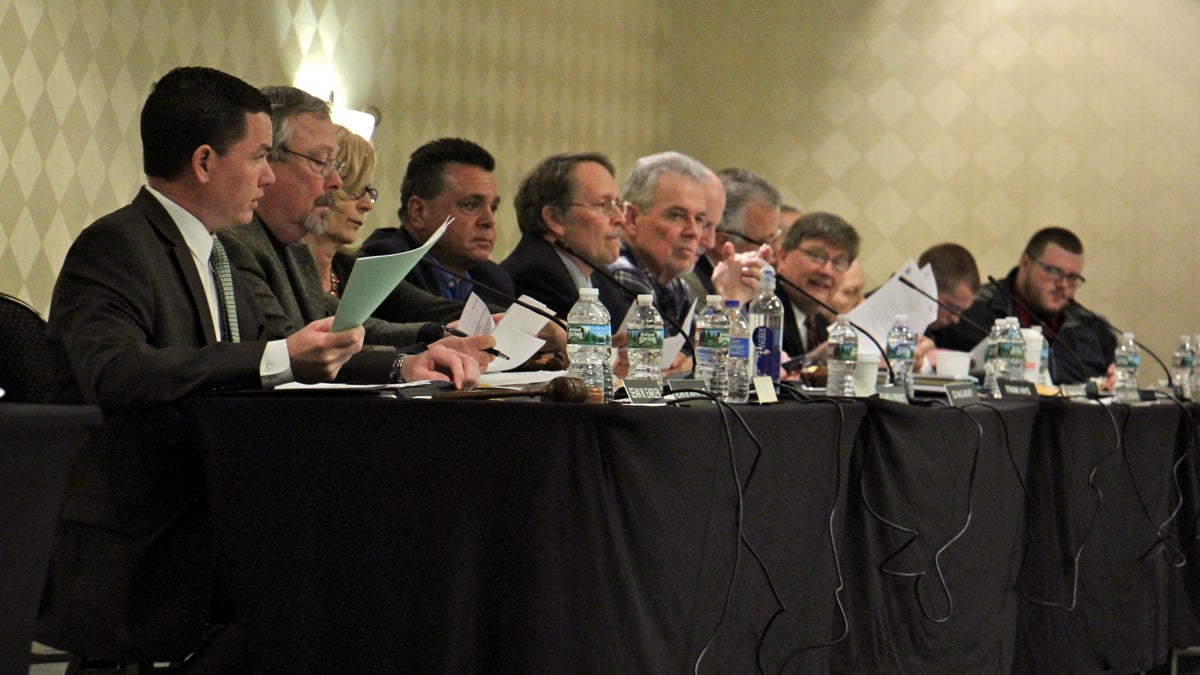Critics worry proposed N.J. ethics law would turn Pinelands into ‘pay-to-play lands’
Listen 2:24
Members of the New Jersey Pinelands Commission preside over a public hearing in Cherry Hill. (Emma Lee/WHYY, file)
It may become easier for members of the Pinelands Commission to vote on issues to which they have financial connections, should a proposal to weaken conflicts-of-interest rules gain approval in the New Jersey Legislature.
The 15 members of the Pinelands Commission, which oversees preservation and development inside the 1 million-acre nature reserve in South Jersey, cannot under current law vote on any matters in which they have a direct or indirect financial interest. Former officials have said the recusal requirement is so broad that it prevents Pinelands commissioners from having a say in a wide range of issues related to the region’s future.
A proposal by Sen. Jeff Van Drew and Assemblyman Bob Andrzejczak, both D-Cape May, would only bar commissioners from voting on matters in which they have a “personal interest,” a lower standard that critics say “creates an ethics loophole big enough to drive a truck through.”
Under the bill, commissioners would be able to weigh in on issues they had a distant connection to as long as it was the same for other members of the same group. For example, a farmer could vote on a policy that affected all farmers.
Jeff Tittel, state director of the New Jersey Sierra Club, said the bill would open the commission to influence by special interests. “You could put a developer on [the Pinelands Commission] who could then vote to have more development that he could benefit on later but doesn’t have a direct interest in now. Or a realtor. Or a gas company employee,” he said. “People can basically turn the Pinelands into the ‘pay-to-play lands.'”
The bill notes that the makeup of the Pinelands Commission must represent the population and activities within the area. For example, the text says, the agency should include farmers to speak on behalf of the region’s agricultural industry, and those commissioners should be allowed to vote on matters that affect the farming industry generally.
Ethics commission weighs in
The proposal comes in response to advice issued by the State Ethics Commission in 2009, when the Pinelands Commission asked whether certain commissioners had to recuse themselves from voting on issues dealing with the Pinelands Development Credit Program known as PDC. It allows for the transfer of development rights to encourage construction away from the preservation and agricultural areas of the Pinelands.
Pinelands Commission staff wanted to know whether members who had received PDCs, owned land that was eligible for PDCs, or owned land within a PDC receiving area could discuss and vote on issues relating to the program.
The ethics commission referred the matter to the state attorney general’s office, which concluded that Pinelands commissioners should recuse themselves on issues in which they had even an indirect interest — including any votes to change the PDC program. “Nothing indicates that the Legislature intended to exempt Pinelands commissioners from the application of the [Conflicts of Interest Law] when they were called upon to consider future amendments to the [Pinelands Comprehensive Management Plan],” wrote senior deputy attorney general Helen P. Chudzik.
Ethics commission deputy director Mark Holmes agreed, writing in 2009 that there is a “significant risk” that commissioners would view changes to the PDC program through the lens of their own potential financial gains or losses. “At a minimum,” Holmes wrote, “such financial interest might reasonably be expected to create an impression or suspicion among the public” of a conflict of interest.
Independent ethics experts have agreed with the 2009 assessment. Former ethics commission chair Paula Franzese said “the proposed amendment … before the Legislature is unsound and creates an ethics loophole big enough to drive a truck through.” Franzese, now the Peter W. Rodino Professor of Law at Seton Hall University, helped write many ethics policies and claimed the proposed bill weakens the state standard for no good reason. “It is bad public policy and bad law.”
But, in the text of their bill, lawmakers Van Drew and Andrzejczak criticized the 2009 guidance from the ethics commission. “It is the sponsor’s belief,” the bill reads, “that the issued advice and its subsequent interpretation and implementation have significantly, unnecessarily, and improperly hampered participation on the Pinelands Commission of members who represent the agricultural industry.”
The bill makes no specific mention of which commissioners it is talking about. Van Drew declined an interview request, and Andrzejczak did not respond to several requests for a comment.
During a June hearing on the bill, Steven Lee, a Chatsworth cranberry grower and former Pinelands commissioner, testified that the bill was “essential to restore the initial concept” of the commission.
Lee said that while he was a member of the Pinelands Commission, he and another commissioner (who was also a farmer) had to recuse themselves from discussing or voting on even broad issues such as forestry regulations because they intersected with their private business interests. The bill “is essential to get the full debate back at the Pinelands Commission table and not push farmers out of the room,” Lee said.
The Assembly Agriculture and Natural Resources Committee passed the bill unanimously in June, but it has not yet been heard by the full Assembly. The Senate bill remains in committee.
Ulterior motives alleged
Tittel, of the Sierra Club, believes that the bill was actually drafted in response to a lawsuit filed by his group over a proposed natural gas pipeline through the Pinelands.
The Sierra Club, which sued over the commission’s approval of a South Jersey Gas pipeline project, has claimed that several commissioners had conflicts of interest and should have recused themselves from voting on the pipeline.
Should this bill become law, Tittel said, it would lend tacit approval to the South Jersey Gas pipeline vote and protect commissioners from any potential conflict-of-interest allegations ahead of another pipeline vote likely to occur in the coming months.
“If we do this,” said Tittel, “it sends a terrible message that ethics doesn’t matter.”
WHYY is your source for fact-based, in-depth journalism and information. As a nonprofit organization, we rely on financial support from readers like you. Please give today.




